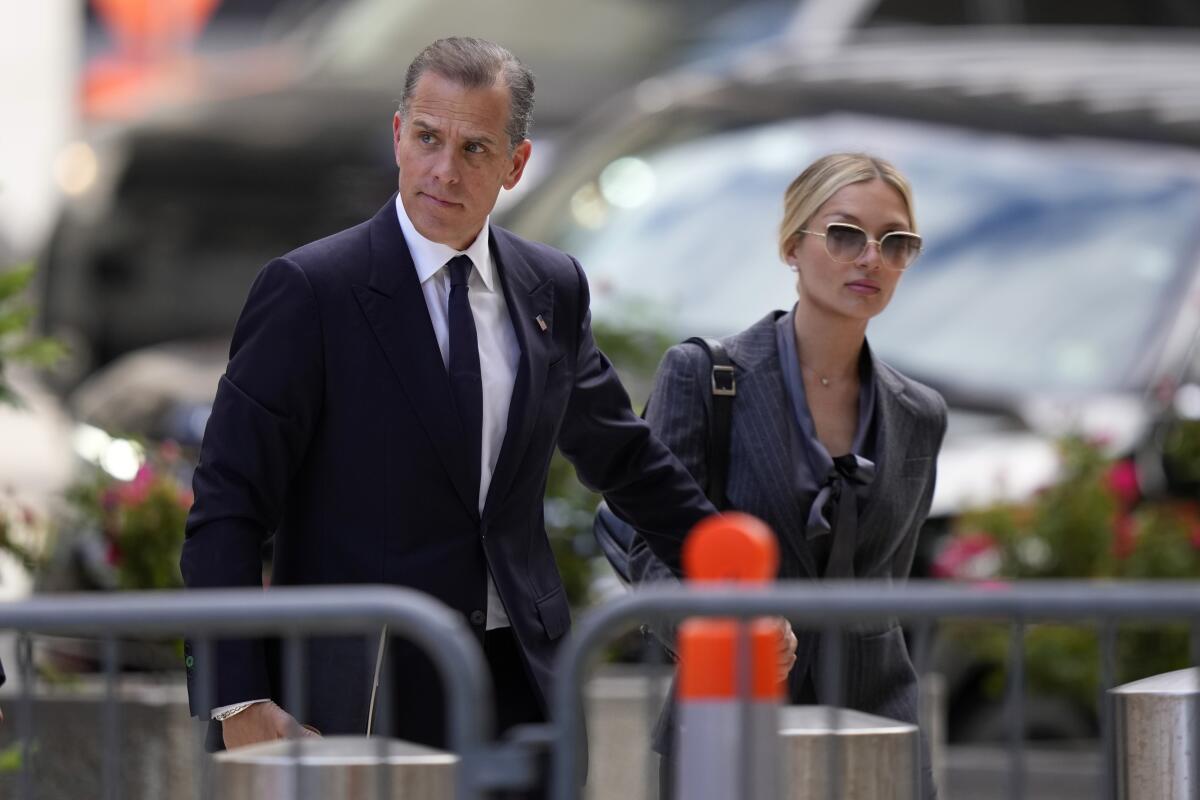Hunter Biden’s words come back to haunt him as trial on gun charges begins

- Share via
WILMINGTON, Del. — Hunter Biden was not on the witness stand, but his voice filled the courtroom.
In the opening day of Biden’s trial on gun charges Tuesday, federal prosecutors projected page after page of his 2021 memoir, “Beautiful Things,” while playing an audiobook of his voice narrating the gritty years of his crack cocaine abuse.
Jurors heard the president’s son describe how he developed a crack habit and learned to cook the drug, which he wrote takes you “into the darkest recesses of your soul, as well as the darkest corners of the community.”
In graphic detail, Biden spoke of dangerous drug deals in Los Angeles’ Skid Row, driving while high and his time as a “bloodhound” chasing crack in Nashville. His superpower, he wrote, was procuring crack anywhere, shelling out tens of thousands of dollars while taking up residence in a string of L.A. luxury hotels, as well as budget motels dotting the East Coast.
“I could get off a plane in Timbuktu and score a bag of crack,” he wrote.
The president’s son, 54, sat stoically during the airing of his words while First Lady Jill Biden sat in the front row beside her daughter, Ashley, and his wife, Melissa Cohen Biden, along with a coterie of relatives and supporters, including L.A. lawyer Kevin Morris.
Some in the court grew emotional, with Ashley Biden appearing to dab tears and her mother reaching an arm around her.
The harrowing recounting of Hunter Biden’s descent fueled by drugs and alcohol bore out federal prosecutors’ promise earlier in the morning to delve into his sordid past — summoning his ex-wife and two former girlfriends, including his late brother’s widow, to testify in coming days — as they began the trial in a Delaware courtroom.
Biden also faces trial on tax charges in Los Angeles later this year.
“No one is above the law. It doesn’t matter who you are or what your name is,” senior assistant special counsel Derek Hines told jurors as Biden sat feet away, flanked by defense lawyers.
In his opening statement, Hines boiled the case down to two elements: that Biden was addicted to crack cocaine for years, and that he had lied about his illicit drug use on a federal background check form in October 2018, when he purchased a Colt revolver at a Delaware gun shop.
“No one is allowed to lie on a federal form like that — not even Hunter Biden,” Hines said, noting that federally licensed gun sellers lack a “crystal ball” to determine whether customers are telling the truth about illegal drug use.
Moments later, defense attorney Abbe Lowell zeroed in on the form that his client filled out in 2018 and, with excerpts projected onto a large screen, asked jurors to study language asking applicants whether they are unlawful users of narcotics or controlled substances.
“It doesn’t say, ‘Have you ever been? Have you ever used?’” Lowell said, and pointed to other questions on the document that did rely on the words “have you ever.”
The distinction was critical, Lowell said, because his client’s years-long drug addiction was punctuated by multiple stays in rehab and periods of sobriety. At the time of the gun purchase, Lowell said, Biden had completed rehab in Los Angeles — where his uncle James Biden and daughter visited him — and had returned to Delaware.
Lowell urged jurors to be mindful of how Biden would have understood the question about drug use on the form and what he had “knowingly” done.
“What was his state of mind when he walked into the gun store?” Lowell said. “Did he knowingly think of himself as someone who should not buy that gun?”
David Weiss, the U.S. attorney for Delaware and the special counsel appointed by U.S. Atty. Gen. Merrick Garland to handle the Hunter Biden investigations, sat in the front row of the courtroom with colleagues.
Weiss’ team has charged Biden with three felony counts: two related to lying about his substance abuse to purchase the Colt revolver, and the third for the 11 days he owned — but never fired — the handgun.
If convicted, Biden could face years in prison. But as a nonviolent, first-time offender, he is less likely to end up behind bars.
The same prosecution team has also indicted Biden in Los Angeles on multiple allegations of tax violations, and that trial — a more complex case that will delve into his foreign consulting business — is scheduled for September.
Biden’s fate rests with a jury of 12 Delawareans — six men and six women, with three female alternates — drawn from all corners of the first family’s home state.
The trial is expected to put a harsh spotlight on the Biden family’s secrets, struggles and tragedies. Prosecutors are expected to show jurors a ream of text messages from Hunter Biden in which he describes his drug use and arranges drug deals — messages intended to bolster the power of his own words in his memoir.
But Lowell urged jurors to scrutinize the timeline of events in the case, telling them in his opening statement to “pay attention to the dates” and focus on October 2018 and what came before it.
Late Tuesday, while cross-examining FBI Special Agent Erica Jensen, Lowell elicited the investigator’s admission that indeed there were times when Biden was sober.
“I do believe that there were ... periods when there was no usage,” Jensen said.
More to Read
Sign up for Essential California
The most important California stories and recommendations in your inbox every morning.
You may occasionally receive promotional content from the Los Angeles Times.











